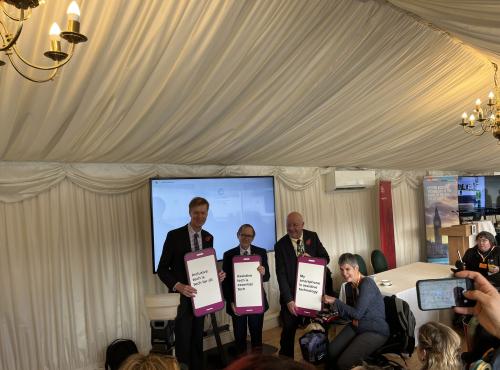What sustainability wants: asks for the next Government
Over the course of May, the UK’s political parties will take it in turn to release the most important weapon in their political arsenal: the manifesto.
These documents will set in stone what each party represents in this election, and their leaders will live and die by them. As always, the sustainability sector looks towards these documents for glimpses of how the next Government might act, and more importantly, the sector tries to shape and influence these outcomes. This year’s snap election has arguably precluded any long-term engagement with policymakers, but that hasn’t stopped leading organisations from the sustainable resource sector from outlining their key manifesto ‘asks’. Policy Connect has just published our own manifesto for sustainability, which calls upon Government to “promote the circular economy in an Industrial Strategy, and commit to providing the stimulus for remanufacturing and greater resource efficiency, which will create jobs and reduce waste.” The Aldersgate Group, CIWM, ESA and the Resource Association have also all published documents outlining their key policy demands that they’d like to see the next Government take on. So what does the sustainable resource sector want?
Firstly, there’s a clear cross-sectoral call for a resource efficiency strategy. The ESA, CIWM and the Aldersgate Group have all called for this as a top-ask in party manifestos, and it’s easy to see why. If the UK is to remain competitive post-Brexit, it needs to learn from other key countries that already have well-developed resource efficiency strategies, such as China, Japan, Germany and France. Resource efficiency is widely viewed as a long-neglected topic of UK government policy, but as many of the responses to the industrial strategy consultation showed, there’s a firm belief that greater integration of resource efficiency into the UK’s much cherished “long-term economic plan” could deliver environmental and economic benefits.
A second clear policy priority for the sustainable resource community relates to ‘standards’. The Resource Association has called on Government to “guarantee that existing environmental standards and protections will remain in place as a minimum and commit to exploring improvements, regardless of the outcome of Brexit negotiations”, whilst CIWM ask that “current environmental standards are maintained and that the UK continues to show ambition on delivering clean growth and a better environment, irrespective of Brexit”. Meanwhile, the Aldersgate Group have called for standards that “require products sold in the UK to be designed with resource efficiency in mind” which should be “as good as, if not better, than those in the EU Circular Economy Package to avoid putting British businesses and consumers at a disadvantage”.
The message is clear: Brexit is seen as a real and present danger, and the Government needs to provide clear assurances that standards will be protected so as to provide the UK with certainty and competitive advantages going ahead. Only a foolish politician would blindly ignore these calls – regardless of how they voted on Brexit, the waste and sustainable resource sector clearly needs standards to ensure it can continue to be a thriving industry in the UK.
The final common theme from these organisations’ manifestos will strongly resonate with the Tory party’s General Election message – the sector wants a strong and stable environment for businesses to operate in. The ESA has stated that they would like to see “policy stability to underpin investment in waste treatment facilities”, CIWM wants “a clear and stable policy direction”, and the Resource Association is asking for clear signals of a “strong and stable policy direction”.
So whatever comes from the UK’s party manifestos over the coming days and weeks, it’s clear that the sustainability sector is looking for three minimums: a strategy for resource efficiency, the maintenance of standards, and a stable future. But whether the Government walking into No. 10 on 9 June will be promising that remains to be seen.



